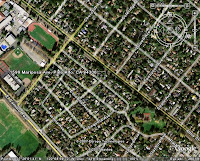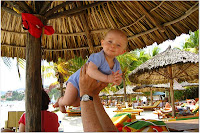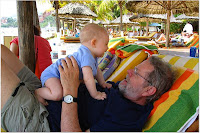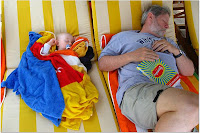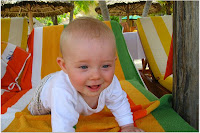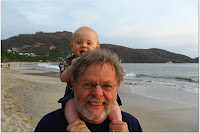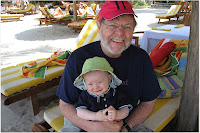This was contributed by Chip to Amiglia:
Uncle Buddy was one of my favorite relatives. I knew him by the name `Buddy’ since forever; I didn’t find out that his given name was `Fred’ until he married Bruna. I can still recall being mildly shocked to hear her use his real name. Being all of 10 years old back then, it had not dawned on me that `Buddy’ was only a nickname, like `Chip’. We had that in common, although I didn’t know it at the time.
My mother once said he was the kindest person she had ever known, and I do believe that was his most essential quality, the one that defines him. My mother once recounted how she and my father had been stranded at the airport in the wee hours, and he had come some thirty or forty miles to pick them up. He was the sort of man who would do such things for people. Most of us would have relegated them to a taxi.
My earliest memories of him are in Chicago, when I was about four. This must have been in 1950 or 1951. My dad must have been doing his residency at the Chicago Eye and Ear Institute. I suppose he and my mother had some weekend plans, because Tim and I spent the weekend with Buddy. He was still married to his first wife, someone named Betty, a nice, but very pale and shy woman with slightly protruding teeth – about as different from Bruna as it is possible to imagine. Uncle Buddy must not have had the slightest idea what to do with two small boys aged 3 and 4, but he did his best – that kindness again. We went to a museum and took a speedboat ride on Lake Michigan, which was a lot of fun.
What he was doing in Chicago then I don’t know. Years later, when I was in the middle school years and an absolutely terrible student, my mother used to tell me about his experience as a cautionary tale. According to her, he had enrolled with his G.I. Bill money in a program at the University of Chicago that would have brought him a master’s degree in only four years. As I was told – repeatedly – he had done superbly in the physical science part of the course, but had for whatever reason refused to satisfy the breadth requirements of the curriculum, leaving himself without a degree when the funds were gone. As a result (according to her, lecturing to me), he was continually frustrated by the lack of a credential, and has to settle for chemical engineering jobs that he was vastly overqualified for. How much of this is true I don’t know. My mother was making a point, not doing history.
On one of the rare occasions when my grandmother Edith acknowledged that anything had gone wrong in any part of her world, she mentioned that he had come back from the war in a low state and had married his high school girlfriend much too quickly. My mother once said (not lecturing this time) that when he lived in Chicago he used to spend a lot of time in black bars, listening to the jazz and making conversation. She was commenting about his musical tastes, but I wonder if it didn’t reflect some depression of his own. At any rate, he was extremely easy to talk to and made all sorts of friends and acquaintances in those hangouts.
I have a few other scraps and patches of memories back then – a really glorious family picnic, Fourth of July or some such, with my Great-Aunt Anna and some cousins from Pittsburgh that I have never seen since, with Buddy in charge of the grill and having a great time. This was the first time I ever saw steak broiled. He also did sleight-of-hand, pulling coins out of ear or nose, which delighted me. But my next tangible memory is from the 1956 time frame. It was the first time I met Bruna.
Not to make too big a deal about it, but this memory is vivid because Bruna was the first truly beautiful woman I had met in real life, i.e., in the flesh and not in the movies, picture or some such. (My mother was beautiful, too, I suppose, but a ten year old son doesn’t think like that.) She glowed with health and vitality, so much so that the impression is still with me. Though she was obviously someone who in the language of the `90’s could be characterized as a trophy bride, my recollection was that he wasn’t at all proprietary, but low key and natural. (Bruna would know for sure, but I suspect that this was one of the attractive aspects about him.) He spoke to her in Italian, which he’d learned by ear. Just what he was doing in Italy I don’t know – some job with an oil company, I think – Bruna would know.
Between that date and the move to Danville in 1967, I don’t recall too much. These were the years of the lectures, when I also got from my mother what family history I know. She said very little about her childhood before the divorce, which must have happened about 1933. She did tell one very sad story about Buddy, which involved a neighbor boy accidentally shooting himself. She ran to get his parents, partly because it was necessary, partly to distance herself from the scene. But Buddy never left him as he lay dying.
She also had happier stories. After the divorce. The family moved frequently to different places around Pittsburgh. One county was fairly rural, and Bujddy went out for track. He did quite well, in the 100 and 200 yard dashes, and was written up in the paper as `Fleet-Foot Freddy’. This was all well and good, but later they moved to a more urban school, with some good black runners, and he was no longer the best.
She also mentioned some things about IQ tests that were interesting. She did quite well on them – but no matter how well she did, he did one or two points better. They were nearly always one and two in the class. This is somewhat sad, because neither one of them were particularly good students. (She was in the lecture mode then, pointing out that high IQ scores don’t insure success. Amen.) She also said he was quite popular with girls, and reasonably successful. He had a habit, before he walked into some teen-age hangout, of rubbing his hands together and saying, loud enough for my mother to hear, `Now, what looks interesting ?’
Uncle Buddy developed his interest in swing music shortly before the war, and with it an interest in radio. He and my Uncle Dick used to sit with earphones on, attempting to bring in distant radio stations.
My mother told me a few things about his military service, but I suspect he said a lot more directly, so I’ll pass on that. One anecdote of interest is that my grandfather Frederick Wurtembaugh evidently published a pome about him in the Pittsburgh paper for which he worked. Because Uncle Buddy was then going by the name O’Neill and Wurtenbach is a German surname, military intelligence had to check the matter out.
The most important interaction I had with my Uncle Buddy occurred in 1967. He and Bruna relocated from Southern California to Danville. While they were househunting, they stayed in the Eastbrook house. My family had gone on vacation. I didn’t join them, because of a summer job I had. Tim was off in Europe on a Notre Dame foreign study program. One weekend in August, I played in a chess tournament on a Saturday, then became sicker and sicker on Sunday. I had severe pain on the right side of my abdomen. Uncle Buddy became more and more concerned. Finally, he suggested the possibility of appendicitis. I knew what that was, but hadn’t the slightest idea that the pain indicated that. I phoned a doctor my family knew well, who arranged for hospitalization and the works. Buddy drove me there. It turned out my appendix was badly inflamed and had to come out then and there. It would be melodramatic to credit my uncle with saving my life, but he certainly helped. He also visited me in the hospital several times the following week, which is the sort of favor no one ever forgets.
We saw much more of each other after the move to Danville, though not nearly so much as we should after my mother’s death. The old story – no one realizes that the time is going until it is all gone. Uncle Buddy was a man of wide and varied interests, and always fun to talk to. The most striking thing was that he was always shy, almost grateful, for the attention. I developed my own interest in probability (in which he was an expert), though not nearly as knowledgeable as he, and I loved to talk to him about that.

